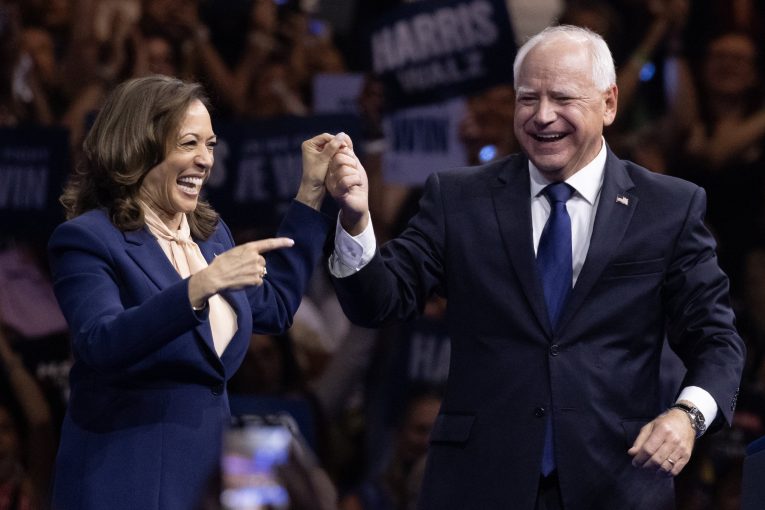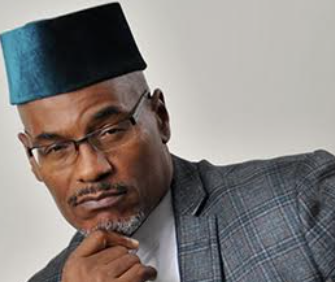The moment we’ve been waiting for

What a Harris-Walz administration could mean for Black people everywhere
By Abdul Latif Balanta Esq.
The United States is about to undergo the most pivotal election in its history. Events here and on the continent of Africa suggest an almost perfect convergence of American and African interests. With a Harris administration, Africa can be the beneficiary of global tensions rather than its spoils—if we play our cards right.
The hopeful election of Kamala Harris to the presidency of the United States coincides with a global awakening of Black people and promises to be one of the most significant American presidencies for the global Black community. The Harris-Walz administration will be far more significant and impactful for Black people than the Obama-Biden one was. Domestically, the Harris-Walz administration will try to restore some of the civil rights losses. Internationally, stronger and more supportive African alliances will become central to stemming the growing threat of BRICS (the group of four nations, Brazil, Russia, India, and China that came together in 2006 and welcomed South Africa in 2010 to challenge the political and economic power of the wealthier nations of North America and Western Europe). For us Black people, this means that our time will have come, we need only seize it.
During the Trump administration, the Department of Justice launched a full assault on civil rights on several fronts. The department scaled back the consent decrees which were designed to protect the civil rights in states with historic discrimination[i]. The Department of Education loosened the requirements for investigating civil rights complaints in schools and rolled back Obama era protections. Voter suppression and draconian immigration policies cast a bleak shadow over America for people of color[ii]. There is little doubt that a second Trump administration would go further, if given the opportunity, making America insufferable for non-whites. The choice for the American voters is clear.
While America is at a pivotal juncture, Africa is also at a crossroads. The awakening of the French-speaking nations from their slumber presents a second round of independence for several nations. The developments in Niger, Burkina Faso, and Mali, and The Alliance of Sahel States (AES/ASS) get little or no coverage in the US. When the event was first reported as a typical coup in Guinea, it received all types of coverage[iii]. When it turned out to be a military action supported by the people, the reporting in America went dark.
Many African Americans, except the well-traveled, do not have the same level of contacts with the French-speaking African countries because of the language barrier. Nonetheless, the African American draws strength anytime an African anywhere rises above his circumstances. We also know that it’s up to us to seek out news from reliable sources. We are fully aware that the information piped into the American echo chamber supports a consistently superior American narrative.
Just as President Barack Obama tried to set the tone of a humbler America[iv], President Harris’ actual upbringing and education give her legitimate “street cred” in this department. Much has been made of her Indian heritage, but she and everyone else know that America sees her as a Black woman. She attended Howard University, which is recognized as the preeminent Historically Black College and University in America. So, she knows who she is and where she came from.
However, she didn’t get to where she is by being too Black. Her record as a prosecutor proved that she was neither a sellout to her people, nor going overboard to show support for the police or by being soft on crime. One of the telltale signs was her refusal to support the death penalty in a high-profile case and the many diversionary programs that she put in place to give criminal offenders a second chance at life[v].
All of this speaks to the character of a Black woman who knows who she is and where she is. Her ability to successfully perform this balancing act suggests an internal fight to preserve her culture and character. This bodes well for when it comes to her dealing with less developed nations. She should be able to accomplish more than Obama could, given that Obama spent half of his presidency proving that he was not a Kenyan. Africa can consider Kamala one of their own.
One of the key things that we as Africans should look for when weighing the sincerity of Harris’ dealings with Africa as president is to see if she puts Black faces in Black places. The US diplomatic corps is full of sufficiently high-ranking African Americans to post, in what is seen as cushy diplomatic placements. If we see some of the same recycled white faces as ambassadors to African countries, we will know that it is business as usual. If, on the other hand, we see people of color in these placements, then there is a greater likelihood that they can provide cover for more aggressive and intimate relations with Africa. It is in America’s and Africa’s interests that the historical ties that bind them be strengthened and made operable.
The timing of the Africans awakening, the increasing movement of African Americans gaining dual citizenship in African countries, the ascendancy of a Black woman to the most powerful office in the world, are all present at once in a lifetime opportunity.
Those who recognize what time it is will reach across the borders through the historic African Continental Free Trade Area Act (AfCFTA) to trade with, and through, your African sister nation. Those who see how the stars have aligned to bring the African American back home will continue to open the doors of business and citizenship. Unlike the “Back to Africa Movement” envisioned by Marcus Garvey and others, the stage is set for a “Back and Forth to Africa Movement” which could propel Africa forward in leaps and bounds.
In America, you will find your brothers and sisters ready, willing and able to support Africa. Africa must have Kamala’s back as well. How? By preferring trade with your brother and speaking up for him when he is strangled by the police, like you did with George Floyd. Likewise, now is the time for the African American to speak up and out when Africa gets a raw deal or is strangled by debt.
There is a lyric to a song of liberation I wrote, which described what this hour means for Africa and the African Diaspora in America. It goes:
There will be no more shackles, when together we find,
I fight for your freedom, and you fight for mine.

Abdul Latif Balanta is a Pennsylvania Attorney practicing in International and Environmental Law. He has been licensed for over 30 years. He is also the Executive Director at the Diaspora Africa Forum, the fully accredited embassy for the African Diaspora in Accra, Ghana Balanta is a dual Ghanaian American Citizen.
[1] https://civilrights.org/trump-rollbacks/
[1] https://www.csis.org/analysis/guinea-causes-and-consequences-west-africas-latest-coup
[1] https://www.theguardian.com/world/2009/jan/25/obama-white-house
[1]
[i] https://www.propublica.org/article/trump-administration-rolls-back-civil-rights-efforts-federal-government
[ii] https://civilrights.org/trump-rollbacks/
[iii] https://www.csis.org/analysis/guinea-causes-and-consequences-west-africas-latest-coup
[iv] https://www.theguardian.com/world/2009/jan/25/obama-white-house

